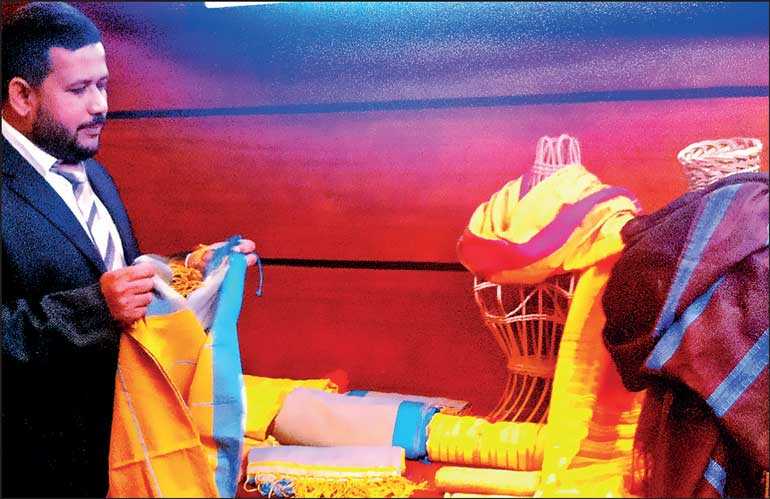Wednesday Feb 18, 2026
Wednesday Feb 18, 2026
Wednesday, 23 January 2019 00:32 - - {{hitsCtrl.values.hits}}

Sri Lanka’s textile and handlooms sector gets a major upgrade after many decades when a global technology platform used in complex patterns is presented to domestic craftsmen and designers this year.
“I have been told that modern hi-tech can greatly increase the productivity of our high quality handlooms,” said the Industry and Commerce Resettlement of Protracted Displaced Persons and Cooperative Development Minister Rishad Bathiudeen on 17 January at his Ministry in Colombo-3. Minister Bathiudeen, joined by Ministry Secretary KDN Ranjith Ashoka and Additional Secretary M. Thajudeen, was addressing a progress review of many institutions under his Ministry on 17 January.
Jacquard machines are used by handloom designers to speed up their manual production looms’ speed. Jacquard machines give the strength of power-looms to handloom machines by speeding up complex handloom designs using a punch-card system.
“Our Sri Lankan handloom designers already use punch-card driven Jacquard machines handlooms for their production. However, these machines are not sufficient to meet the speed of today’s handloom market. The Textiles and Handlooms Development Division of the Ministry therefore will replace these punch-card machines to digital, computerised Jacquards. I have been told that this modern hi-tech can greatly increase the productivity of looms and appeal of the design,” said Minister Bathiudeen on 17 January.
Accordingly, the Ministry plans to install the first high quality digital Jacquard system at its Sri Lanka Institute of Textile Technology, Ratmalana at an estimated cost of $ 20,000. This system will be used to demonstrate and train national level handloom producers as well as private sector suppliers who would be encouraged to import them on their own and competitively sell to local handloom producers. The Textile Department plans to import eight more digital Jacquards to be given to each province to train the provincial producers and encourage provincial machinery importers. Sri Lanka’s handloom sector is one of the low cost, but high earning industries. The production is labour intensive and the industry consumes less electricity and utilities, but generates higher employment. It is estimated that more than 12,000 personnel are engaged in it. Wayamba, Western, and Central are the key provinces for Lankan handlooms.